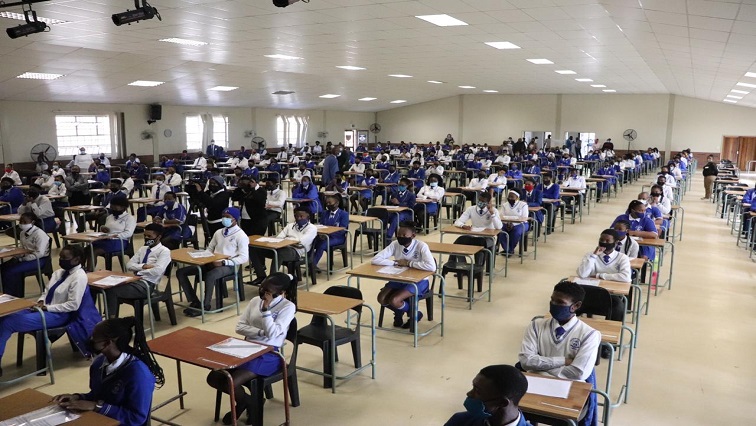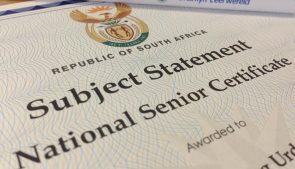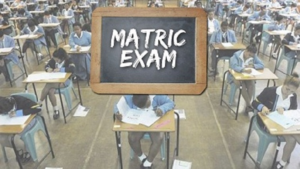The Department of Basic Education says it prioritises matric candidates despite the challenges faced by all schools across the country. This as matric candidates started writing their final examinations.
The department says they have ensured that challenges like sanitation, lack of proper classrooms and vandalism do not interfere with studying and preparations for the examinations.
The department has also ensured that matric candidates are provided with proper classrooms, study materials, and extra lessons.
Although the department gets finance from the office of the Treasury every financial year, the budget does not meet all the challenges in schools. Some schools use a paper budget to buy school equipment. There are multi-purpose halls that are reserved as exam centres. The Department of Public Works also donated mobile classrooms to cater for the grade 12 candidates.
A teacher at Vuxeni Senior Secondary school in Phalaborwa, Limpopo, Cate Mabunda, says the department prioritises matric students.
“The department provides the school with a maintenance budget. The matric candidates at my school are moved to other classes, where they cannot be disturbed and, even better, the department provides mobile classrooms with air conditioners. This is to ensure that learners are able to study under proper conditions while vandalised classrooms are fixed.”
The South African Constitution states that education must be free, accessible, and equal for all children. The South African Human Rights Commission has a Constitutional mandate to monitor the realisation of the right to basic education in South Africa.
The education department has ensured that this right is followed by all schools, and also vowed to resolve all the challenges faced in schools and to invest in matric candidates.
The department has ensured that a maintenance team is on board and has provided schools with mobile classrooms for learners to study and prepare for their examinations.
The Ehlanzeni district’s communications officer, Mr J Mwali, says classrooms are maintained and have lights in all the schools.
“The grade 12 candidates make use of primary school halls for camping and some community halls are also used as exam centres. The community halls will accommodate grade 12 candidates when writing the exam,” says Mwali.
Sanitation:
The department has a campaign that focuses on sanitation challenges. The Sanitation Appropriate for Education (SAFE) initiative aims to replace all basic pit toilets with appropriate sanitation in accordance with the norms and standards for school infrastructure.
The Minister of Basic Education, Angie Motshekga said that provincial departments identified 3 898 schools at the start of the SAFE initiative.
“There were 2 814 schools on the SAFE programme and the upgrading of sanitation had been completed at 1 564 schools.”
The Eastern Cape is one of the provinces which currently has the most backlogs when it comes to school infrastructure. However, the department plans to improve this by the end of the 2022/2023 financial year, when they hope to eradicate all pit toilets at schools across the country.
Some schools are provided with enviro loo (toilets) for hygiene purposes. The department has provided some schools with water storage tanks and boreholes to pump and store water in Jojo tanks.
Vandalism in schools:
The Department of Education has been facing vandalism issues for years. The Mpumalanga education department has an annual campaign called “Rhanza Xikolo Xa Wena”, and also ensures that maintenance plans are followed by schools.
Rhanza Xikolo Xa Wena campaign seeks to address most of the negative challenges experienced at schools by mobilising communities to own and safeguard their respective schools.
“There are community gardens in schools that assist in the sense of the community having ownership and love for the schools because they plough and take care of or look after the schools,” says Mwali.
The department of education has encouraged schools to employ professional security companies to look after the schools, especially during the night and when they are in recess. The SGB committee has formed the “Adopt a cop” campaign, to assist with vandalism in schools.
The Adopt a Cop campaign works with police stations. In each school, there has one police officer that works with the school police forum to patrol around schools to ensure that both learners and school property are safe.
All the best to our Grade 12 learners starting their final exams this week! You have prepared to succeed and your results will showcase these efforts! #mybrainline #onlineschool #brainline #ieb #homeschool #elearning #schoolathome #matric #exams pic.twitter.com/wYB4sEZctq
— Brainline | Breinlyn (@myBrainline) October 20, 2022






